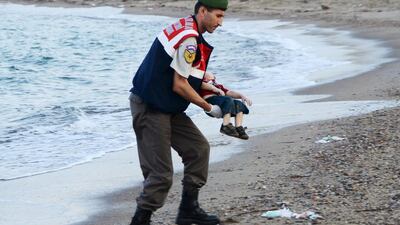Last week, two young Syrians set out with their parents on a short boat trip from Bodrum, in Turkey, to the nearby Greek island of Kos.
The tragic results of that trip, and the pictures of little Aylan Kurdi, washed up on the shore, have shocked the world. Only the father survived. The pictures have stirred demands that governments act more rapidly, and decisively, to tackle the humanitarian crisis that has now spread from the Middle East, with its millions of Syrian refugees, to Europe and beyond.
The father of Aylan Kurdi has been quoted saying: "We want the world's attention on us, so that they can prevent the same from happening to others. Let this be the last."
There will, I am sure, be more deaths as flimsy boats set off from the Turkish and Libyan coasts, and as packed lorries cross Europe, organised by gangs of people-smugglers who care only about the money they can extract from those who are desperate to seek a better life. Perhaps, though, the heartbreaking pictures of Aylan Kurdi will be the moment when the tide changed, when the human aspect was finally understood.
On the same day, two little children from the Syrian city of Aleppo, Ikaline and Abdul Malik, began school in a small town in Sweden, where they had arrived – by plane, not boats and trains – a few weeks ago. They had fled Syria for Turkey with their mother a year ago, spending months there waiting for their asylum applications to be accepted.
Those kids, the grandchildren of my sister-in-law, along with another little Iraqi child, are the only non-Swedes in their school and have been given a tender welcome by the other children and by the teachers. They and their immediate family can now start a new life, away from the horrors they witnessed in Aleppo.
I cannot express adequately the gratitude that my wife’s family and I feel towards the Swedish government and people. I hope that the children will soon be joined by their five young cousins and their mothers, currently in limbo in Lebanon.
However generous the governments of Europe – and its people – may be, there is no way in which Europe can absorb all those who have fled the Syrian conflict. For most of the millions of refugees in Jordan, Lebanon, Turkey, Iraq and elsewhere, the best hope must be that the conflict will end, so that they can return home, with aid to help them to survive until that becomes possible. In that context, it’s worth noting that Britain, whose government is being criticised, rightly in my view, for not accepting more refugees, has given far more in relief assistance than most countries, donating, so far, nearly Dh6 billion in aid for those in the refugee camps.
We too, in the UAE, have played our part. The latest figures suggest that the UAE has contributed Dh1.98 billion in aid of various forms.
And, despite some foreign criticism that the UAE hasn’t accepted any refugees, a statement by a government official noted a few days ago that “the UAE has provided a safe haven for thousands of Syrians and Palestinians with Syrian documents who have been given permission to come here to join family members and friends already resident in the UAE.”
They too are refugees, even if they are not formally registered with the United Nations.
There are no simple solutions to this crisis. The granting of asylum to hundreds of thousands and the provisions of billions of dollars in aid can never be enough. The Syrian regime and the barbarians of ISIL must be removed so that the possibility of going home, the preferred option for most, can become a reality.
Until then, however, let us hope that the death of Aylan Kurdi, his brother and mother will not have been in vain and that the world will respond, as it should.
Peter Hellyer is a consultant specialising in the UAE’s history and culture


